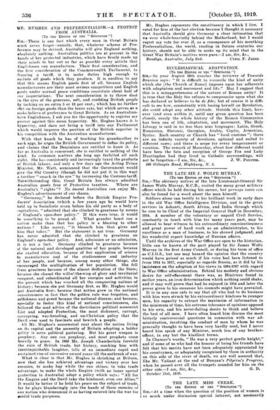ECGHES AND PREFERENTIALISM.—A PROTEST FROM AUSTRALIA.
[To THE EDITOR OF THE " SPECTATOR."]
Ein,—There is one fact which every man in Great Britain must never forget—namely, that, whatever scheme of Preference may be devised, Australia will give England nothing, absolutely nothing. Australian politics are at present in the hands of her protected industries, which have firmly made up their minds to bar out as far as possible every article that Englishmen can manufacture. Their first consideration, and the first consideration of the Comnsonwealth Parliament, in framing a tariff, is to make duties high enough to exclude all goods which they produce. It is needless to say that this means English goods first of all, because English manufacturers are their most serious competitors and English goods under normal peace conditions constitute about half of our importations. The next consideration is to throw dust in the eyes of the generous, soft, and confiding British people by tacking on an extra 5 or 10 per cent., which has no further stfet on foreign goods than the lower rate, but which serves as a make-believe of preference to Great Britain. As an Australianborn Englishman, I ask you for the opportunity to rogister my protest against this mean hypocrisy. Mr. Hughes knows it is hypocrisy, and dare not bring a tariff into our Parliament which would improve the position of the British exporter in his competition with the Australian manufacturer.
With that knack he has of teaching his grandmother to suck eggs, he urges the British Government to define its policy, and claims that the Dominions are entitled to know it. As far as Australia is concerned, she is entitled to nothing of the kind. In economic matters she long ago forfeited all such right. She has consistently and increasingly taxed the products of British labour, and only a few days ago the Acting Prime Minister. Mr. Watt, announced that the Government would give the Old Country (though he did not put it in this way) a further " smack in the eye " by increasing the Customs tariff. Notwithstanding this, Great Britain has always admitted Australian goods free of Protective taxation. Where are Australia's " rights "? No decent Australian can enjoy Mr. Hughes's advertisement of our shame.
"Germany," he declared before the British Empire Pro
ducers' Association (which a few years ago he would have held up to Socialistic scorn before his old party as a body of capitalists), "admitted that she climbed to greatness by means of England's open-door policy." If this were true, it would be something to be proud of. What grander boast can a nation make than that her policy is a blessing to other nations ? Like mercy, " it blesseth him that gives and him that takes." But the statement is not true. Germany has never admitted that she climbed to greatness on England's open-door policy. And, admission or no admission, it is not a fact. Germany climbed to greatness because of the natural and developed qualities of her people, because she exalted education, because of her application of science to manufacture and of the studiousness and industry of her people, and because, among many other things, she encouraged the multiplication of her population. She fell from greatness because of the almost deification of the State; because she chased the will-o'-the-wisp of glory and territorial conquest, and subordinated all her energies and activities to the pursuit which has wrecked all the conquering nations of history; because she put Germany first, as Mr. Hughes would put Australia first; because that notion grew in the national consciousness so fast that the golden rule was forgotten, and selfishness and greed became the national disease; and because, specially to foster this kind of national consciousness, she followed the mad advice of the doctrinaire political economist I.ist and adopted Protection, the most dishonest, corrupt, corrupting, war-breeding, and un-Christian policy that the Devil ever used to fascinate and bewitch a people.
All Mr. Hughes's nonsensical rant about the nation living on its capital and the necessity of Britain adopting a bolder policy is mere political posturing. But his great weapon is prophecy. Any one can prophesy, and most prophets come heavily to grass. In 1903 Mr. Joseph Chamberlain foretold the ruin of British trade, but history, mocking him with inextinguishable laughter, tells of an immediate rapid and sustained rise of successive record years till the outbreak of war.
What is clear is that Mr. Hughes is shrieking at Britain, now that she has achieved advantage and victory over her enemies, to make hay while the sun shines, to take trade advantage, to make the whole Empire (with an inner special protection to Australia) adopt a policy which says : "All for the Empire and the Devil take the hindmost, even our Allies." It would be better if he held his peace on the subject of trade, for he plays blunderingly into the hands of those enemies of
our nation who denounced it as having entered into the war for sordid trade purposes. Mr. Hughes represents the constituency in which I live. I voted for him at the last election because I thought it necessary that Australia should give Germany a clear intimation that we were whole-heartedly behind the Motherland, but I would regret my vote for ever if, as a consequence of his mouthing Preferentialism, the world, reading in future centuries our history, should not be able to make up its mind that in the Great War Britain's motives were pure.—I am, Sir, &c., Bendigo, Australia, Julu 2nd. CYRIL F. JAMES.










































 Previous page
Previous page